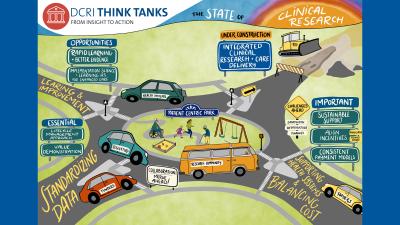
The State of Clinical Research and Healthcare
The DCRI Think Tank is an interactive meeting that engages diverse perspectives and leadership expertise from academia, industry, government, agency, and payer groups to address key issues in clinical research, policy, and practice to improve health.
On July 31, 2024, an expert panel led a DCRI think tank session around recent government initiatives, emerging evidence generation and implementation strategies, and potential changes to payment structures that affect clinical research and care delivery.
Key Takeaways
Standardization of healthcare data collection is needed to improve interoperability and efficiency within the evidence-generation ecosystem.
- Efforts involving several federal agencies, including the National Institutes of Health, Food and Drug Administration, and Centers for Medicare & Medicaid Services, are underway to facilitate data collection standardization to improve the national evidence-generation system.
- Although many programs, including the United States Core Data for Interoperability (USCDI) and USCDI+ initiatives, provide structure and resources to support common data collection, these standards have not been broadly adopted.
- Differences in data collection practices between organizations can hinder interoperability, limiting their use for patient care and research.
- New data acquisition methods and the advancement of artificial intelligence may provide additional opportunities to facilitate evidence generation and dissemination.
Collaboration between diverse stakeholder groups with purposeful inclusion of marginalized patient populations will be integral to improving evidence generation and equitable health outcomes.
- Interdisciplinary efforts are underway to integrate evidence generation into primary care practice, although limited funding is a barrier.
- With support from key stakeholders, including funders and health system leadership, healthcare providers can facilitate a “learning healthcare system” that aligns urgent patient needs with research priorities.
- Listening sessions with multidisciplinary stakeholders, including patients, community groups, primary care providers, hospital systems, research networks, and federal agencies, will be imperative to improving the evidence-generation system.
Balancing the cost and value of medical innovations and ensuring equitable access to new therapies remains a challenge.
- Channeling scientific advances into drug development that are impactful and affordable for representative patient populations is difficult due to economic burdens and evolving regulatory requirements and legislation.
- Demonstration of societal value is essential for stakeholders throughout the product lifecycle.
- Exorbitant administrative and data requirements are burdensome for research groups and can hinder innovation and progress throughout the clinical development process.
- Even with high-quality and accessible data, limited bandwidth, financial constraints, and outdated infrastructure create barriers for hospital systems to implement new evidence into clinical practice.
- Misalignment in reimbursement incentives between payers and providers undermines successful payment reform.
Actionable Items
- A “learning health care system” that integrates research activities into standard clinical care is a goal. Policy and practice must be universally adjusted to make this happen.
- Clinical trial protocols must develop eligibility criteria that are representative of the populations that stand to benefit from the investigational therapies.
- Organizations participating in clinical research should prioritize standardizing data collection using common data elements; however, a central organization needs to define these elements for use across the U.S.
- Alignment of payer and provider payment incentives will be critical to successful health system payment reform and medical innovation.
- Decreased regulatory administrative burden, where feasible and appropriate, may be implemented to simplify clinical development from a regulatory perspective.
- Where possible, stakeholders should leverage existing data to facilitate expedient evidence generation.